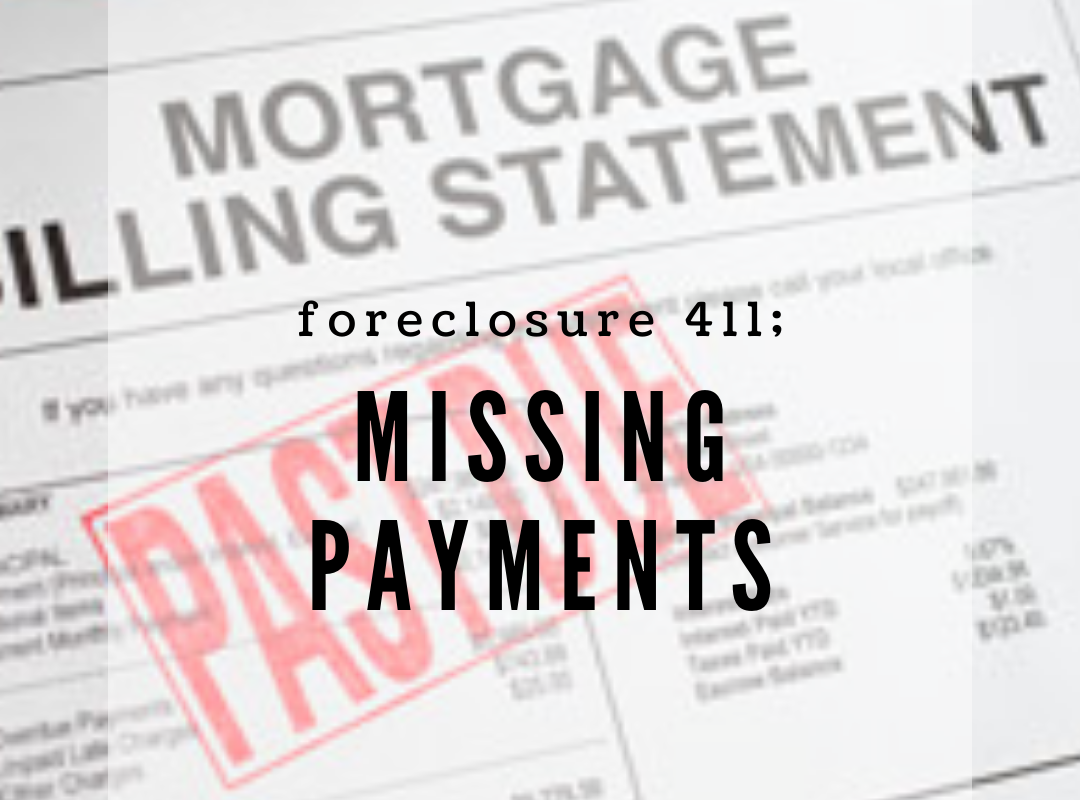Are you wondering how many mortgage payments you can miss before foreclosure the foreclosure process begins?
Honestly, there is no one answer to this question. The number of missed payments before foreclosure varies depending on the policies of the lender and your personal financial situation.
Some banks are lenient and work with you to avoid foreclosure even after a series of delinquent payments. They may waive missed payment altogether, or spread out amounts due over several months.
Other banks are less forgiving and push foreclosure as soon as possible (even with just a single late payment). Luckily, legal safeguards prevent banks from immediately foreclosing on your home.
Let’s tackle the question of missed payments by walking through what happens from when you miss a payment, until the lender files a foreclosure lawsuit.
What Happens After The First Missed Payment?
What is a “Grace Period?”
Many mortgage lenders will give you a grace period after missing a mortgage payment, known as a grace period. To verify if your mortgage includes a grace period, check for the information in your mortgage note. This grace period is usually 15 days long, so if your mortgage payment was due on the first of each month, it would only be considered “late” after the grace period. You can make your payment any time in the grace period without incurring any penalties.
After the grace period has passed, you are normally charged a late fee on top of the mortgage payment due. This fee usually ranges between 3% and 5% of the amount of your missed payment, as outlined in the terms of your mortgage. For example, if your late fee was 5%, you would have to pay a $50 late fee on a $1,000 mortgage payment if you were to go over your grace period.
Grace periods and late fees do vary by mortgage lender, so be sure to check the details in your mortgage document to get your exact information. Remember that a late fee will be added on every month that you pay after the grade period. You should try to resolve the late fee as soon as you possibly can to avoid continuing to add on the fee.
What Happens At 30-Days Past Due?

The bank may report your delinquent mortgage payment to credit bureaus such as Experian and TransUnion after it is 30-days past due. This can have a long-term effect on your credit score.
At the 30-day delinquency mark, you will start receiving contact from your mortgage lender. They will ask you why you haven’t made your payments. Use this opportunity to be open and honest with your lender about any anticipated payment problems and inquire about your options.
Federal law requires the bank to contact you no later than 36 days after the delinquency. According to Attorney Amy Loftsgordon at NOLO:
If a borrower falls behind in payments, a servicer must attempt to contact the borrower to discuss the situation no later than 36 days after the delinquency. If appropriate, the servicer must tell the borrower about loss mitigation options—like a modification, short sale, or deed in lieu of foreclosure—that might be available to the borrower.
By the time your mortgage payment is 45-days late, lenders must appoint personnel to help you with “loss mitigation”.
“Loss mitigation” is the name for the process where a delinquent borrower and their lender work together to help the homeowner avoid the foreclosure process. The majority of loan servicer companies employ specialists who are there to tell you what documents to provide, receive your application, give you information, and answer your questions. Your lender has 30 days to evaluate you for the available loss mitigation options and advise you on eligibility.
Under federal mortgage servicing laws, the servicer must assign a person or a team for the borrower to speak with via phone, who is there to respond to questions and work with the homeowner through the loss mitigation process. The appointed person must assist you with:
- What loss mitigation programs are available to you
- Completion of the loss mitigation application
- Updates on the review and status of your loss mitigation application
- The appeals procedure if your loss mitigation application is denied
- When your mortgage delinquency will result in filing a foreclosure lawsuit.

What Happens At 90-Days Past Due?
After missing 3 months of payments and being 90 days past due, you normally receive a “breach letter” from the bank on most mortgages.
There is a provision in many mortgages which will require the mortgage lender to send a “breach letter” that is a notice telling you the loan is in default. The breach letter will also include details like how to cure the default and get your loan reinstated, and the date (at least 30 days from the date that notice is given to the borrower) that the loan must be cured by. This letter is sent before the lender accelerates the loan and files a foreclosure lawsuit with your state’s judicial system.

At this point, you should be looking into your options to avoid the foreclosure process. Contact the loss mitigation team at your mortgage lender for a “mortgage workout” or think if selling your property makes sense for you. You can find out more information about alternatives to the foreclosure process here.
Our company, 60 Second Home Buyers, buys houses in nation wide– including cash closings for properties facing foreclosure.
What Happens at 120-Days Past Due?
Prior to 120-days past due, the bank could not file foreclosure against you.
Pursuant to the Dodd-Frank Act and Consumer Financial Protection Bureau, there is a “120-Day Loss Mitigation Period” that prevents lenders from filing a foreclosure lawsuit.
The relevant statute is 12 CFR Part 1024 (Regulation X):
Pre-foreclosure review period. A servicer shall not make the first notice or filing required by applicable law for any judicial or non-judicial foreclosure process unless: (i) A borrower’s mortgage loan obligation is more than 120 days delinquent; (ii) The foreclosure is based on a borrower’s violation of a due-on-sale clause; or (iii) The servicer is joining the foreclosure action of a superior or subordinate lienholder.
You can often extend this 120 day period by filing a “loss mitigation application” with the mortgage servicer as discussed above. If you don’t extend the period, you can expect the lender to proceed with the foreclosure filing.
The Foreclosure Filing
If you have not resolved missed payments or obtained time extensions, your lender may proceed to file a foreclosure lawsuit after the late payment is 120-days overdue.
The lender begins by filing a “Notice of Default” (known as a “Lis Pendens”) and Complaint in the Connecticut county where the property sits. The map below shows what county each Connecticut town is a part of. The bank is required to serve you with the Complaint, and you then have 20-days to respond to the Complaint with your “Answer”. If you fail to respond to the Complaint, the court may enter a default judgment in favor of the lender.

If you haven’t already, you should contact a local foreclosure attorney or approved foreclosure counselor to go over legal defenses and all other available options. Your state may also have resources for foreclosure defendants on their website.
Ways to Avoid Foreclosure
If your facing foreclosure, consider every option. Homeowners may be able to prevent foreclosure (as well as save their house and credit score) with a proactive mindset.
Options to avoid foreclosure include:
- “Mortgage Workout” (working with your lender modify the loan to payments you can afford)
- Selling Before Foreclosure (pay off the mortgage – and get cash in your pocket – with sale proceeds)
- Deed-in-Lieu of Foreclosure (transfer ownership to the bank)
- Filing For Bankruptcy (bankruptcy courts issue an “automatic stay” on creditors)
- Disputing The Foreclosure (assert available legal defenses)
- Renting the Property (use rental profits to make your monthly payments)
- Mortgage Assistance Programs (financial and counseling help)

